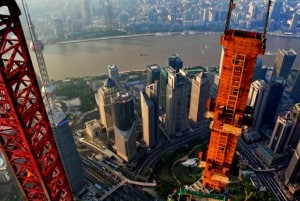China’s office developments are set to expand by 173 percent by 2016, according to a recent survey, as real estate developers rush to take advantage of the country’s growing commercial sector.
The report by Insite Asset Management, a Chinese consulting firm which advises real estate developers and manages properties, predicts that the nation’s developers will roll out 58 million square metres of new offices nationwide by the end of 2016. This 173 percent increase over existing levels is seen as potentially causing oversupply in some locations.
For retail real estate, the situation appears more favorable, with the study indicating that 15 million square metres of new mall space will be released to the market during 2014, with the total new stock available rising to 35 million square metres by the end of 2016.
In comments published in the China Daily, Sunny Zhang, general manager of the corporate research center of Insite noted, “Although the retail real estate sector is growing a little fast, it is healthier than the office sector.”
Zhang predicted challenges for projects that lack clear appeal to consumers. “A lack of differentiation of shopping malls is one of the major risks for retail real estate,” Zhang said.
Growing Gap Between 1st and 2nd-Tiers
While the amount of space may be growing nationwide, China still suffers from a shortage of both office and mall space in prime districts of its major cities.
A report published by real estate consultancy CBRE earlier this month found that two out of the world’s ten most expensive office locations are in Beijing, with space in Beijing’s Financial Street (Jinrong Jie) averaging US$2120 per square metre per year, and offices in the Central Business District area averaging US$2042 per square metre per year.
The Beijing market is expected to continue to encounter rising prices in the next two years as demand outstrips supply. In Shanghai, prices have cooled off as more new buildings open, with some observers predicting a glut as the 220,000 square metre Shanghai Tower opens in the city.
The major oversupply, however, is in the country’s 2nd and 3rd tier cities where many developers have overbuilt. Shanghai-based Shui On Land recently fired its CEO as the company’s stock suffered due to poor sales at the developer’s projects in Dalian, Wuhan and other emerging cities in China.

Leave a Reply